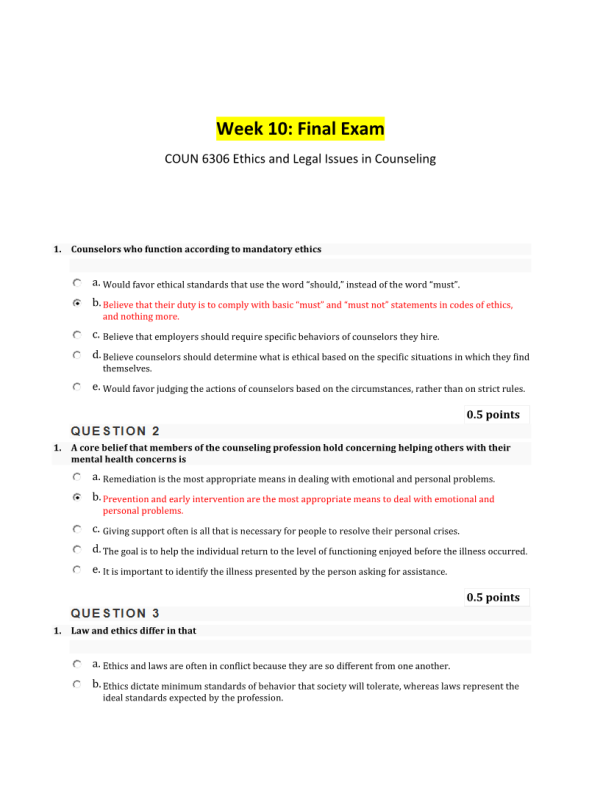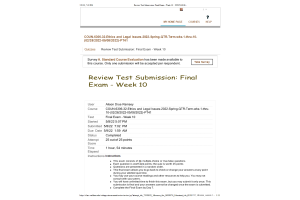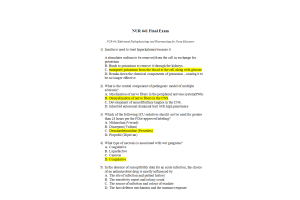COUN 6306 Ethics and Legal Issues; Week 10 Final Exam (Score 25 out of 25 Points)
Course : COUN 6306 Ethics and Legal Issues in Counseling
Contributed : Megan
- $39.00
- Question: Counselors who function according to mandatory ethics
- Question: A core belief that members of the counseling profession hold concerning helping others with their mental health concerns is
- Question: Law and ethics differ in that
- Question: At their most fundamental level, codes of ethics serve to
- Question: The best statement about the nature of professional ethics in counseling is that
- Question: The term “culturally encapsulated counselor” refers to a counselor whoreality according to one set of cultural assumptions and fails to evaluate other viewpoints
- Question: During the time that a counseling student is counseling clients in a practicum or internship setting, the student counselor
- Question: Once counselors have disclosed their legal questions to their immediate supervisors and have received a response either from the supervisor or from an attorney who is advising them as to the proper course of action
- Question: Distressed counselors or counselors suffering from burnout are terms used to refer to
- Question: When counseling clients who are terminally ill and wish to explore end-of-life decisions, counselors should do all of the following EXCEPT:
- Question: Supervision agreements between a clinical supervisor and supervisee
- Question: Within the counseling profession, the primary national voluntary certification agency is
- Question: Legal principles view the contents of a client’s counseling records as belonging to
- Question: Counselors may view a client’s social media profile.
- Question: The primary difference between a boundary crossing and a boundary violation is
- Question: With respect to confidentiality and privileged communication
- Question: A fundamental tenet of the wellness model is that
- Question: Parents who object to their child’s participation in counseling
- Question: When uncertain about the privileged status of information requested for disclosure through a subpoena, a counselor consults with
- Question: The practice of providing counseling services over the Internet
- Question: Breaches of client confidentiality by counselors
- Question: When local chapters, state branches, regions, and divisions of ACA receive ethical complaints against members, they refer them to
- Question: The only dual relationships that are prohibited by the ACA Code of Ethics are those
- Question: Which of the following is TRUE of cultural diversity in technology use:
- Question: In the process of explaining informed consent in family counseling, counselors should
- Question: When a member expresses a desire to drop out of an ongoing group, the counselor should
- Question: What mental health professionals are qualified to diagnose using the DSM system?
- Question: In distance counseling, informed consent should include
- Question: Counselors who practice from a developmental perspective
- Question: When documenting for self-protection
- Question: Laws
- Question: It is impossible for counselors to understand all aspects of the law but the best advice for counselors who face legal questions is to
- Question: All of the following are challenges associated with distance counseling, EXCEPT:
- Question: If a counselor wants a person other than a biological parent (such as a step-parent or grandparent) to have confidential information regarding a child client, a simple solution is to
- Question: Boundaries serve to protect the welfare of clients because
- Question: It would be ethically permissible for you to consider entering into a bartering arrangement with a prospective client if
- Question: While principle ethics asks the question, “What should I do?” virtue ethics asks the question
- Question: Cultural competencies in working with LGBTQIQ clients include
- Question: The primary purpose of the ACA Code of Ethics is
- Question: School counselors have a legal obligation to do all of the following EXCEPT:
- Question: A counselor’s self-disclosure in a counseling session
- Question: Storing clients’ records electronically
- Question: If a counselor is asked to disclose privileged information about a client who cannot be located, then the obligation to assert the privilege rests with
- Question: To be effective when counseling clients with physical disabilities, counselors
- Question: Generally, counselors create clinical case notes
- Question: As advocates, counselors are aware that
- Question: When a counselor who is working under supervision shares confidential information about clients with her or his supervisor
- Question: To be a culturally sensitive counselor, when a client from a different culture offers a counselor a gift, the counselor
- Question: If a subpoena for the counseling records of a client is received, a counselor who works in a mental health agency should
- Question: The Family Educational Rights and Privacy Act of 1974 (FERPA), which is sometimes referred to as the “Buckley Amendment,” affects all.


